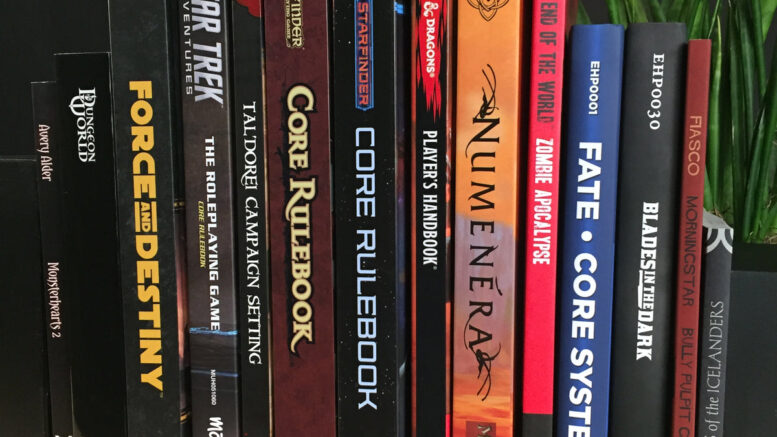Introduction:
Welcome to our comprehensive blog series on tabletop RPGs! In this in-depth review and analysis series, we will dive into the mechanics, settings, and overall gameplay experience of popular tabletop role-playing games (RPGs). Whether you’re a seasoned RPG enthusiast or new to the world of tabletop gaming, this blog will serve as a valuable resource for understanding and exploring the exciting realm of RPGs. So grab your dice, gather your friends, and embark on an adventure through the pages of this blog post.
Table of Contents
- Understanding Tabletop RPGs: An Overview
- Dungeons & Dragons: The Legendary Fantasy RPG
- Pathfinder: Evolving the Classic Fantasy Experience
- Shadowrun: The Fusion of Cyberpunk and Fantasy
- Call of Cthulhu: Unleashing the Cosmic Horror
- The World of Darkness: A Gothic Playground
- Conclusion
Understanding Tabletop RPGs: An Overview
In this section, we will provide a brief introduction to tabletop RPGs, explaining their basic mechanics, storytelling aspects, and player interaction. Understanding the fundamental concepts behind RPGs will help us appreciate the intricacies of the games we will review in subsequent sections.
Dungeons & Dragons: The Legendary Fantasy RPG
Dungeons & Dragons (D&D) has captivated the hearts and minds of players for decades. We will explore the rich history, diverse settings, and innovative mechanics that have made D&D the iconic tabletop RPG it is today. From character creation to epic adventures, we’ll analyze what makes D&D an essential game for RPG enthusiasts.
Pathfinder: Evolving the Classic Fantasy Experience
Pathfinder has emerged as a successful alternative to D&D, offering a deep and immersive fantasy experience. We’ll delve into the game’s unique rule system, expansive setting, and its commitment to player agency and storytelling. Discover why Pathfinder has become a favorite among RPG fans seeking a fresh twist on traditional fantasy gaming.
Shadowrun: The Fusion of Cyberpunk and Fantasy
Blending the worlds of cyberpunk and fantasy, Shadowrun presents a unique and captivating gameplay experience. We’ll examine the game’s dystopian setting, innovative mechanics, and the intriguing mix of magic and technology. Uncover the secrets of this genre-bending RPG that has gained a devoted following.
Call of Cthulhu: Unleashing the Cosmic Horror
Prepare to be consumed by the mind-bending terror of Call of Cthulhu. We’ll explore the Lovecraftian mythos, investigate the investigative horror mechanics, and discuss how this game immerses players in a world of cosmic dread. Discover why Call of Cthulhu is a standout RPG for those who crave atmospheric and psychological storytelling.
The World of Darkness: A Gothic Playground
Step into the World of Darkness, where vampires, werewolves, and other supernatural beings roam. We’ll delve into the dark and immersive setting, explore the game’s narrative-driven mechanics, and discuss how it encourages character development and moral choices. Unearth the mysteries and complexities that make the World of Darkness an alluring RPG experience.
Conclusion: Find Your Adventure
As we conclude our journey through the realms of tabletop RPGs, we hope this blog post has provided you with valuable insights into the mechanics, settings, and overall gameplay experiences of some of the most popular RPGs out there. Each game offers a unique and immersive world for players to explore, collaborate, and create memorable stories. Whether you prefer high-fantasy epics, cyberpunk thrillers, Lovecraftian horrors, or gothic dramas, tabletop RPGs have something to offer everyone.
FAQs
What are tabletop RPGs?
Tabletop RPGs are role-playing games played using pen and paper, dice, and rulebooks. Players create characters and embark on cooperative storytelling adventures guided by a game master.
What is the difference between tabletop RPGs and video game RPGs?
Tabletop RPGs offer a more immersive and collaborative experience, with players interacting face-to-face and relying on imagination. Video game RPGs are digital adaptations that provide a visual and interactive experience.
Which RPG has the most expansive setting?
Dungeons & Dragons is renowned for its vast and diverse settings, including the Forgotten Realms, Eberron, and Ravenloft, offering players a multitude of worlds to explore.
Are there RPGs that combine multiple genres?
Yes, Shadowrun is a notable example of a tabletop RPG that combines cyberpunk and fantasy elements, providing a unique and engaging gameplay experience.
Can I play tabletop RPGs solo?
While tabletop RPGs are traditionally played with a group of friends, many games offer solo play options or have adaptations specifically designed for single players.
How do RPG mechanics work?
RPG mechanics govern character creation, combat, skill checks, and more. They provide a framework for resolving actions and determining the outcome of player choices within the game world.
Which RPG is best for beginners?
Dungeons & Dragons is often recommended for beginners due to its accessibility, abundance of resources, and supportive community. The simplified version, D&D 5th Edition, is a great starting point.
Can I create my own RPG?
Absolutely! Many RPG systems provide tools and guidelines for creating custom settings and adventures. Additionally, there are universal RPG systems that allow for limitless creativity.
How long does an RPG session typically last?
The duration of an RPG session varies depending on the group and the game being played. Sessions can range from a few hours to an entire day or longer for more extensive campaigns.
Are there online platforms for playing tabletop RPGs?
Yes, there are various online platforms, such as Roll20, Fantasy Grounds, and Tabletop Simulator, that facilitate virtual gameplay, allowing players to connect and enjoy RPGs remotely.

Be the first to comment on "Game Reviews: Exploring the Mechanics, Settings, and Gameplay of Popular Tabletop RPGs"